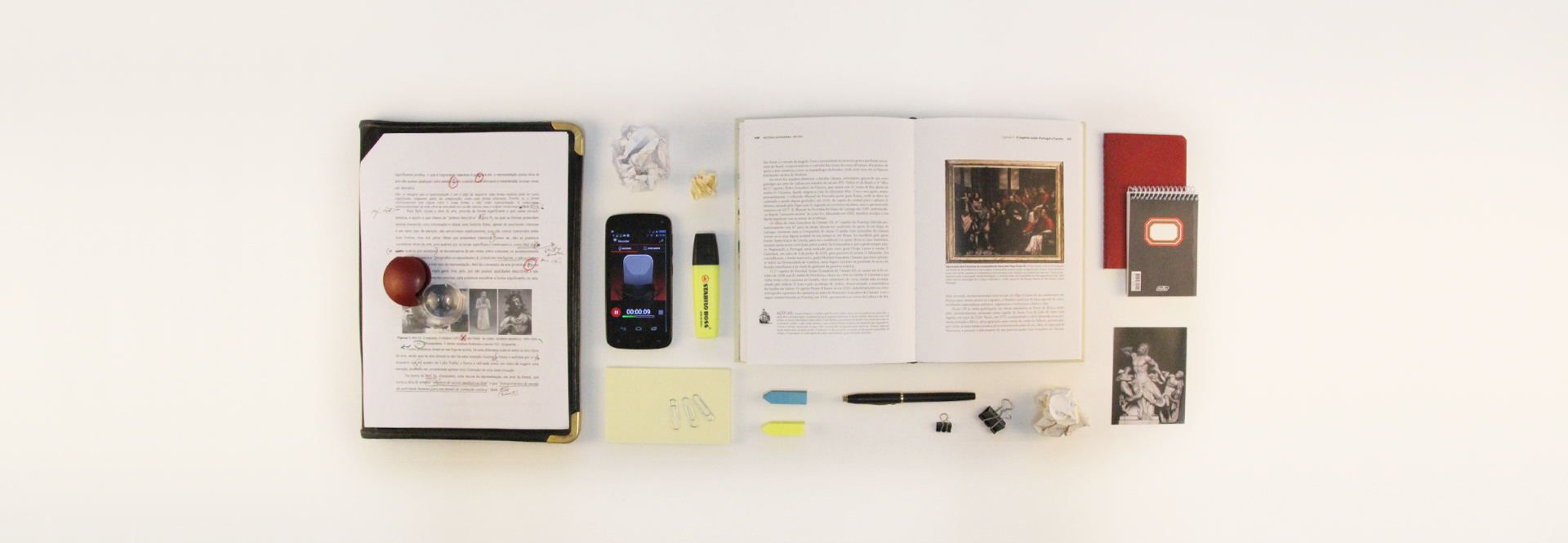
Undergraduate Degree in Cultural Studies
- The curricular plan highlights several areas of knowledge and is based on a inter and transdisciplinary approach, thus providing students an analytical and critical thinking, allowing them to understand the complexity of cultural practices and speeches.
- The curricular structure of this undergraduate degree promotes a coherent articulation of the curricular units in the field of cultural studies, namely in the fields of humanities and social sciences.
- The Undergraduate degree in Cultural Studies provides a significant number of optional curricular units from areas such as Cultural Studies, Literature, Languages, Linguistics, Arts, Humanities, Anthropology and History, enabling students to build distinctive profiles, that are in line with the increasing demands of today’s society.
- This degree also gives students the opportunity to enrol in a disciplinary internship, allowing future graduates to be in contact with different realities, through greater articulation between the University, the civil society and institutional structures (public and private), particularly in the context of Autonomous Region of Madeira (“Região Autónoma da Madeira - RAM").
This Undergraduate degree intends to:
- Provide multi and transdisciplinary knowledge related to cultural phenomena in contemporaneity, through an interdisciplinary approach;
- Provide students with methodological tools for the success of their first cycle of studies, in order to enter the labour market and/or to be qualified to pursue their studies in subsequent cycles;
- Diversify one’s knowledge in optional domains;
- Provide communicative competences in foreign languages;
- Develop joint mechanisms between the University and the civil society, especially in the context of Madeira.
Competency Profiles:
- This degree, with the interaction of several fields of culture, intends to graduate students with multidisciplinary competences, allowing them to integrate in professional projects in public and private bodies in the sector of culture, whether it is in a professional context or in post-graduate training
- The Undergraduate degree of Cultural Studies promotes a higher active involvement of students, their intervention and self-responsibility in their academic qualification and path.
Agreements with public and private institutions in the framework of an disciplinary internship:
The disciplinary internship takes place in the curricular unit Practices in Cultural Studies (“Práticas em Estudos de Cultura”), instructed in the second semester of the third academic year. Out of the 64 hours of this curricular unit, the internship has the length of 40 semestrial hours. It integrates cooperation agreements, cultural actions and scientific research. For this purpose, the University of Madeira signs, for a revocable year, covenants with several institutions of Madeira. Through a proposal submitted by the student, supervised by the professor of the curricular unit and approved by the parties involved, students will have the opportunity of partaking an internship in City Halls and Museums, in RTP-Madeira, in Associação Musical e Cultural Xarabanda, in Nini Andrade Design Center, in the Study Centre of Atlantic History (“Centro de Estudos de História do Atlântico”), in the Regional Archive and Public Library of Madeira, and in Research Centres, enabling students to integrate teams with projects in the field of cultural studies.
GENERAL INFORMATION
DGES CODE:
1300/L150 (INSTITUTION/DEGREE)
Duration of Studies:
6 SEMESTERS / 3 YEARS
CONCURSO NACIONAL 25/26:
34OPENINGS AVAILABLE
Classificações Mínimas:
Nota Candidatura: 95
Provas de Ingresso: 95
Fórmula de Cálculo:
Média Secundário: 50%
Provas de Ingresso: 50%
Admission Exams:
ONE OF THE FOLLOWING SETS:
(11) HISTORY
(18) PORTUGUESE
OR
(09) GEOGRAPHY
(18) PORTUGUESE
OR
(06) PHILOSOPHY
(18) PORTUGUESE
AVERAGE OF THE LATEST CANDIDATE 24/25:
1st Call - 112,7 POINTS
2nd CALL - 130,8 POINTS
3rd CALL - 130,3 POINTS
- The Undergraduate degree in Cultural Studies is aimed at students interested in acquiring solid knowledge in the field of cultural phenomena, that characterize the contemporary society.
- The curricular plan highlights several areas of knowledge and is based on a inter and transdisciplinary approach, thus providing students an analytical and critical thinking, allowing them to understand the complexity of cultural practices and speeches.
- The curricular structure of this undergraduate degree promotes a coherent articulation of the curricular units in the field of cultural studies, namely in the fields of humanities and social sciences.
- The Undergraduate degree in Cultural Studies provides a significant number of optional curricular units from areas such as Cultural Studies, Literature, Languages, Linguistics, Arts, Humanities, Anthropology and History, enabling students to build distinctive profiles, that are in line with the increasing demands of today’s society.
- This degree also gives students the opportunity to enrol in a disciplinary internship, allowing future graduates to be in contact with different realities, through greater articulation between the University, the civil society and institutional structures (public and private), particularly in the context of Autonomous Region of Madeira (“Região Autónoma da Madeira - RAM").
This Undergraduate degree intends to:
- Provide multi and transdisciplinary knowledge related to cultural phenomena in contemporaneity, through an interdisciplinary approach;
- Provide students with methodological tools for the success of their first cycle of studies, in order to enter the labour market and/or to be qualified to pursue their studies in subsequent cycles;
- Diversify one’s knowledge in optional domains;
- Provide communicative competences in foreign languages;
- Develop joint mechanisms between the University and the civil society, especially in the context of Madeira.
Competency Profiles:
- This degree, with the interaction of several fields of culture, intends to graduate students with multidisciplinary competences, allowing them to integrate in professional projects in public and private bodies in the sector of culture, whether it is in a professional context or in post-graduate training
- The Undergraduate degree of Cultural Studies promotes a higher active involvement of students, their intervention and self-responsibility in their academic qualification and path.
Agreements with public and private institutions in the framework of an disciplinary internship:
The disciplinary internship takes place in the curricular unit Practices in Cultural Studies (“Práticas em Estudos de Cultura”), instructed in the second semester of the third academic year. Out of the 64 hours of this curricular unit, the internship has the length of 40 semestrial hours. It integrates cooperation agreements, cultural actions and scientific research. For this purpose, the University of Madeira signs, for a revocable year, covenants with several institutions of Madeira. Through a proposal submitted by the student, supervised by the professor of the curricular unit and approved by the parties involved, students will have the opportunity of partaking an internship in City Halls and Museums, in RTP-Madeira, in Associação Musical e Cultural Xarabanda, in Nini Andrade Design Center, in the Study Centre of Atlantic History (“Centro de Estudos de História do Atlântico”), in the Regional Archive and Public Library of Madeira, and in Research Centres, enabling students to integrate teams with projects in the field of cultural studies.
DGES CODE:
1300/L150 (INSTITUTION/DEGREE)
Duration of Studies:
6 SEMESTERS / 3 YEARS
CONCURSO NACIONAL 25/26:
34 OPENINGS AVAILABLE - 1ª FASE
Classificações Mínimas:
Nota Candidatura: 95
Provas de Ingresso: 95
Fórmula de Cálculo:
Média Secundário: 50%
Provas de Ingresso: 50%
Admission Exams:
ONE OF THE FOLLOWING SETS:
(11) HISTORY
(18) PORTUGUESE
OR
(09) GEOGRAPHY
(18) PORTUGUESE
OR
(06) PHILOSOPHY
(18) PORTUGUESE
AVERAGE OF THE LATEST CANDIDATE 24/25:
1st Call - 112,7 POINTS
2nd CALL - 130,8 POINTS
3rd CALL - 130,3 POINTS
{{currentVideo.curso_videos_descricao}}
{{otherVideo.curso_videos_descricao}}
{{currentVideo.curso_videos_descricao}}
{{otherVideo.curso_videos_descricao}}
Career Opportunities and Employability
The Undergraduate Degree of Cultural Studies provides competences and qualifications needed for professional activities linked to the area of Culture. With a solid training and with profiles adjusted to each path, the graduate may choose to go through cultural programmes in public and/or private institutions, cultural advisory in the framework of cultural centres and associations, libraries and city halls, production of scientific content for the cultural industry and editorial supervision.
With the competences in the several fields of cultural studies, students may apply to second cycles of studies, namely those taught in University of Madeira.
Candidates
This degree is aimed at those whose ambition it’s to develop their aesthetic and critical awareness about the areas of culture, literature and art. Candidates may apply via the National Higher Education Access Contest, providing they successfully passed one of the required admission exams. Candidates may also enrol via special regimes such as course/institution transfer, through one of the Special Contests in force or the International Student Statute.

-
1st
YEAR
SubjectScientific AreaECTS1st semesterOptional Group BOptional Group A2nd semesterOptional Group DOptional Group C
-
2nd
YEAR
SubjectScientific AreaECTS1st semesterOptional Group E2nd semesterOptional Group F
-
3rd
YEAR
SubjectScientific AreaECTS1st semesterOptional Group G2nd semester
-02.png)
The mission of Agency for Assessment and Accreditation of Higher Education (A3ES) is to contribute to improving the quality of Portuguese higher education, through the assessment and accreditation of higher education institutions and their study programmes.
-
Curricular Plan
-
Accreditation/Assessment
The mission of Agency for Assessment and Accreditation of Higher Education (A3ES) is to contribute to improving the quality of Portuguese higher education, through the assessment and accreditation of higher education institutions and their study programmes.
{:pt}Curso acreditado por 6 anos, a partir de 19-11-2015.{:}{:en}Degree accredited for 6 years, from 19-11-2015.{:} Check this degree’s evaluation > - Other Information

